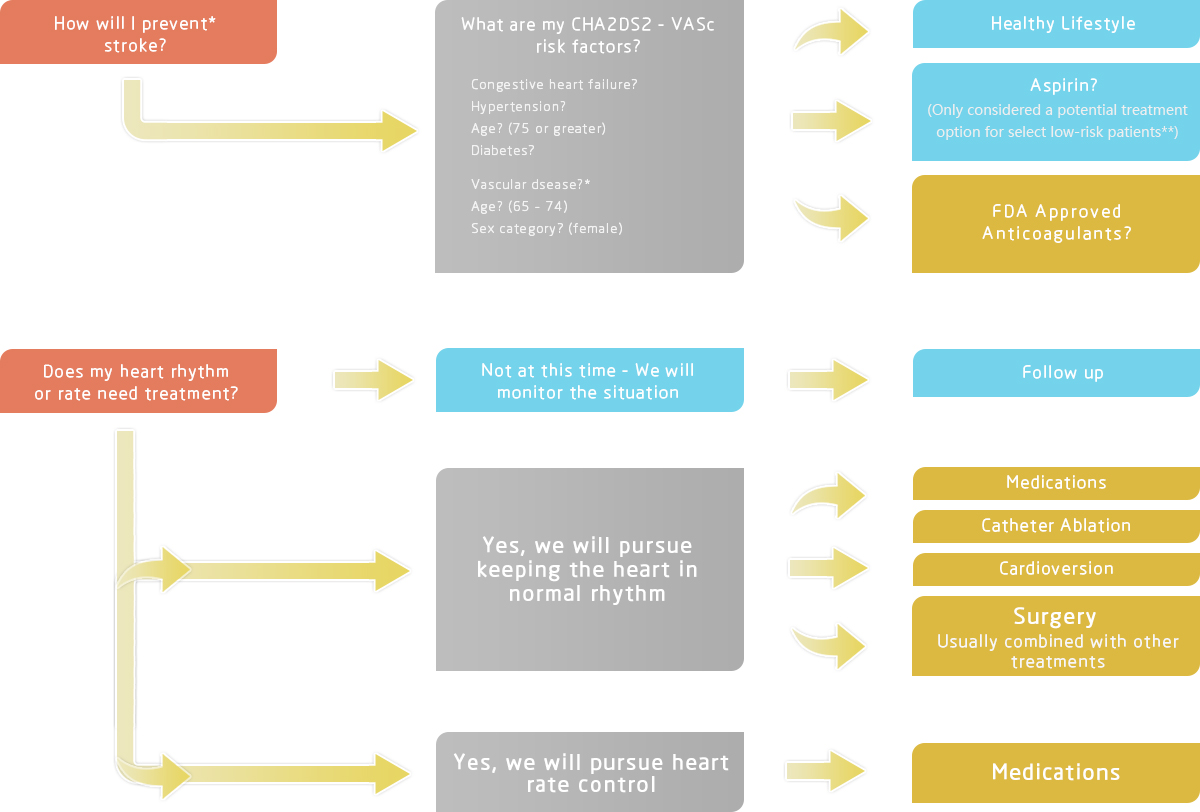Identify Your Potential AFib Risks
Know Your Risk for Stroke
Enter your information below to generate a visual to help you understand your risk for stroke.
Talk with your healthcare professional to discuss your CHA2DS2–VASc score and treatment plans.
CHA2DS2–VASc Factors Increasing Stroke Risk.
Consider your health history and answer the following questions.
CHA2DS2–VASc Factors Risk Level:
Circle the number that matches the total risk points from the Yes column.
Always check with your doctor to verify your risk score. The guidelines recommend “blood thinning”* medications for people who have added risks.
- 0 People who score 0 do not usually need “blood thinners.” It is always important to make this decision together with your doctor.
- 1 People who score a 1 may or may not need “blood thinners.” Your doctor will help you decide what is right for you.
- 2 Or more Guidelines recommend “blood thinners” for people who score 2 or more. Your doctor will help you decide what is right for you.
NOTE: This self-check tool does not replace the risk assessment you need to complete with your healthcare provider. This tool helps you see which health factors can add to your risks. The higher your levels, the higher your risk for stroke.
* “Blood thinner” is a common term for anticoagulant medication that reduces the blood’s ability to form a clot that can cause a stroke.
房颤跟踪管理
Af Tracking Management
1
心率跟踪
无线心电检测仪-UN
给健康带来无微不至的呵护
高精度 | 蓝牙 | 方便携带
居家必备 使用方便
依托于自主研发的强大运算功能和核心算法
为您提供各项指标的实时监护
家人健康尽在掌握
帮助发现和跟踪心脏疾病,捕捉异常心电信号供就医参考
2
饮食跟踪
3
运动跟踪

Is your goal realistic?Run it through this checkliet to find out.
-
Is your goal easy?
(Example:When I wake up in the morning,I will dance to one song before I get ready for three days in a row.)
-
Is your goal specific?
(Example: I will wear a tracker and check my step count after I brush my teeth for days this week.)
-
Do you have a clear prompt to remind you?
(Example:For the next three days,when Itake a phone call from a friend,I will walk while Italk.)
I'm in!My Goal
(Example:I will take a short walk break when I return from dropping the kids off at school for the next three days.)

4
药物跟踪
How Do I Manage My Medicines?
Taking medicine may be new to you, and there may be a lot to remember. For example,why are you taking it? What time should you take it?How often do you take it, and how many pills do you take? It’s very important to take medicine the right way — just as your doctor tells you.If you don’t follow your doctor’s directions,what could happen? First of all, if medicine isn’t taken the right way, it may not work. It could also cause side effects that may be mild — or very harmful. Without knowing it,you could counteract one medicine by taking it with another. Not taken properly, medicine can also make you feel sick or dizzy.
How can I remember to take my medicine?
- Take it at the same time each day along with other daily events, like brushing your teeth.
- Use a weekly pill box with separate sections for each day or time of day. Computerized pill boxes can alert you when it’s time to take a pill or order refills.
- Ask family and friends to help remind you.
- Use a pill calendar or drug reminder chart.
- Leave notes to remind yourself.
- Try an e-mail or calendar reminder.
- Wear a wristwatch with an alarm.
What else should I know?
- Ask your doctor or pharmacist when to take your medicines and if they can be taken with foods.
- Store your medicine the way your doctor or pharmacist tells you. Keep medicine in original containers, or label new containers.
- Keep track of what pills you can and can’t take together, including over-the-counter medicines.
- Always get your prescription filled on time, so you don’t run out.
- Try to see the same pharmacist each time.
- Don’t take more of your medicine than the prescribed dose.
- Ask your doctor or pharmacist before buying a new over-the-counter medicine, such as an antihistamine or“cold tablets” or vitamin supplements to be sure they won’t interfere with your prescribed medicine.
- Always check with your doctor before you stop taking a medicine.
- If you have any questions about your pills, make a note to remind yourself to ask your doctor or pharmacist.
- Tell your doctor and pharmacist if you have any side effects.
- Write down the names and doses of medicines you are taking. If you go to more than one doctor, take your updated medication list with you to each visit.
- Keep all medicines out of the reach of children.
My Medicines
Ask your healthcare providers to help you complete the chart below.
| NAME OF MEDICINE |
WHAT IT LOOKS LIKE |
WHAT MY DOSAGE IS |
WHAT IT’S FOR |
WHEN TO TAKE IT |
NAME OF DOCTOR |
|
|
|
|
|
|
|
|
|
|
|
|
|
|
|
|
|
|
|
|
|
|
|
|



